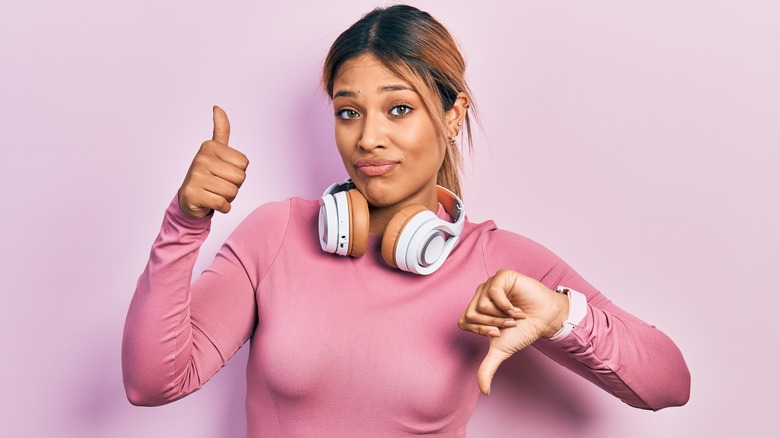Throughout time and across cultures, music has played a role in communication, self-expression, communal celebration, and more (via International Association for Cross-Cultural Psychology). In addition to providing entertainment, music has also been used in clinical settings due to its unique benefits on our physical and mental health. According to the American Music Therapy Association, music therapy can be used to enhance memory, promote physical rehabilitation, reduce pain, and cope with stress.
As the most common mental health disorder in the United States, anxiety affects more than 40 million adults across the country (via NAMI). Clinical treatment methods often include psychotherapy and/or the use of prescription medications.
In addition, many who experience anxiety also use relaxation techniques such as breathing exercises, meditation, or journaling. Music has also proven to be a powerful tool when it comes to managing anxiety symptoms. For example, studies have shown music to significantly reduce levels of anxiety in pregnant individuals (via Journal of Clinical Nursing) as well as cancer patients undergoing treatment (via Wiley-Blackwell).
When listening to music, different compositional factors can impact our mood, such as tempo, melody, and genre. While musical taste and corresponding emotional responses are unique to each person, if you’re looking to try something new, here’s one musical genre you may want to consider adding to your self-care routine.
Different genres may alleviate or worsen anxiety

Neurologist Kulreet Chaudhary explains to mindbodygreen that classical music can have a neutralizing effect on anxiety due to its formulaic structure, stating, “When you are exposing your brain to things that are orderly, your brain itself becomes orderly.”
Music therapist Elizabeth Coombes highlights the characteristics of genres such as classical music that make it effective at reducing feelings of anxiety, writing via The Conversation, “The speed of the music should be relatively slow, the melody should be simple, and the beat and harmony should not hold too many surprises.”
Conversely, an observational study conducted by cosmetic surgery center in Turkey, the Vera Clinic, examined how various music genres impacted anxiety levels in listeners through measurements of their heart rate and blood pressure (via The New York Post). After listening to Spotify playlists containing a variety of different tracks across genres and decades, researchers found that out of the 1,540 volunteers between the ages of 18 and 65, techno music induced blood pressure increases in 78% of participants. Consequently, researchers deemed techno music to be the music genre “least effective at reducing anxiety”, according to DJ Mag.
But no matter the genre, Dr. Chaudhary tells mindbodygreen that the best type of music for calming anxiety will be what each person finds personally uplifting, stating, “What is connecting to your heart? What is uplifting you? That internal connection, where you can feel an emotional response to the sound is so important.”